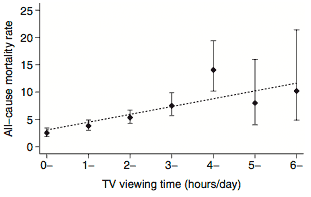![]() Today I had to put off my normal morning run in order to make time to be interviewed on a radio show at 7:30 a.m. As I waited on hold for the interview to start, I could hear the hosts joking back-and-forth about what the "latest TV controversy" is. "Is it the Jay Leno / Conan O'Brien news on NBC?" the host asked? No. Then the hosts rattled through several other hot-button issues on television before arriving at this: "New research from the American Heart Association Journal [Circulation] suggests that watching TV might actually reduce how long you live." How's that for a controversy?
Today I had to put off my normal morning run in order to make time to be interviewed on a radio show at 7:30 a.m. As I waited on hold for the interview to start, I could hear the hosts joking back-and-forth about what the "latest TV controversy" is. "Is it the Jay Leno / Conan O'Brien news on NBC?" the host asked? No. Then the hosts rattled through several other hot-button issues on television before arriving at this: "New research from the American Heart Association Journal [Circulation] suggests that watching TV might actually reduce how long you live." How's that for a controversy?
The host, John Hockenberry of The Takeaway, then introduced the lead author of the study in question, David Dunstan, and me, and asked us to explain how watching TV may or may not result in death. Dunstan's team's study, as you might expect, has gotten a lot of media attention. There was a press release, a report on CNN, and many others. It was nearly midnight in Dunstan's home in Australia, and he had been taking interviews all day.
I had been selected as a commentator because of my column a few weeks ago on SEEDMAGAZINE.COM where I discuss the harms and benefits of TV. So, presumably, my "pro-TV" viewpoint would balance Dunstan's "anti-TV" research.
But for the most part, science doesn't lend itself to this sort of position-taking. We can understand the results of a study, and perhaps do a bit of speculating on the implications, but beyond that there really isn't much room for taking sides. So let's take a closer look at the study in question.
Dunstan's team analyzed data from the massive AusDiab study of diabetes and related diseases in Australia. In 1999 and 2000, researchers visited over 28,000 randomly-selected Australian households to gather medical and other data, to be revisited over many years following. For this study, the researchers identified 8,800 adults who met their criteria for participation (basically, they showed no signs of cardiovascular disease, they completed the entire response form and medical tests, and their results fell in a normal range). Then they observed who died over the next six to seven years, a total of 284 individuals.
Since all the respondents in this sample had reported on their TV-watching habits during the week prior to their initial interview, it was a simple statistical calculation to determine more TV-watching was associated with more deaths. Here are those results:

The graph plots mortality rate (per 1000 person-years) against TV viewing-time. The population averaged about 50 years of age, so over 6 or 7 years, you would certainly expect some of them to die, and that's what you see. The error bars here are 95 percent confidence intervals, which means that plot points are significantly different when they overlap by up to about half the length of the error bars. That means it's quite clear that people who said they watched four or more hours of TV per day were significantly more likely to die than people who watched no TV. Even when the numbers were adjusted for exercise, age, and waist circumference, TV-watchers were significantly more likely to die during this period than non-TV-watchers (though the relationship was now not quite as strong). Indeed, after these adjustments, there were significant differences in risk of death between the groups who watched 0 to under 2 hours, 2 to under 4 hours, and 4 or more hours of TV per day.
The researchers were careful to only count periods when the respondents were sitting in front of the TV, not while they were working out, or doing household chores, so in a sense what they were really measuring is passive sitting time. Things aren't looking very good for TV-watchers: even exercising doesn't seem to counteract the effect of watching of a lot of TV.
But how do these actual results compare to media reports? Take a look at the press release, which says that each hour spent in front of the television daily was associated with:
- an 11 percent increased risk of death from all causes,
- a 9 percent increased risk of cancer death; and
- an 18 percent increased risk of cardiovascular disease (CVD)-related death.
That's true, but what the release doesn't say is that these relationships aren't all statistically significant after adjusting for all experimental factors. Each individual hour of increase isn't significant either, just the overall pattern. What's also a little confusing is that these "increased risks" are compared to the baseline of no TV-watching. So watching 6 hours of TV per day doesn't mean you're 6 * 18 = 108 percent certain of death! It means roughly 108 percent more than the baseline rate of about 2.5 deaths per 1000 years. And look back at the graph to see the very wide confidence interval suggesting that the actual rate (if the study had surveyed the entire population) is most likely somewhere between 5 and 20 -- we don't know exactly where.
What's more, all these results are only correlations. We don't know if TV-watching causes death, because participants weren't randomly assigned to TV-watching and non-TV-watching groups. That said, the study matches well with a Canadian study that correlated sedentary behavior with high mortality, and with a US study that I discussed in the Seed column, which found that obesity was correlated with TV-watching.
So while this study's results may not quite match up to the hype, all of the research is consistent with a storyline suggesting that a lot of sedentary behavior is not good for your health, especially cardiovascular health.
So was I able to say anything good about TV in my interview? As I mentioned in my Seed column, there are some benefits to society: In rural India, a study found that treatment of women improved after cable TV was introduced in communities. And people report that they feel less lonely while watching TV, which is definitely better than the alternative. Just don't do it for six hours a day!
Dunstan, D., Barr, E., Healy, G., Salmon, J., Shaw, J., Balkau, B., Magliano, D., Cameron, A., Zimmet, P., & Owen, N. (2010). Television Viewing Time and Mortality. The Australian Diabetes, Obesity and Lifestyle Study (AusDiab) Circulation DOI: 10.1161/CIRCULATIONAHA.109.894824

 Cognitive Daily reports nearly every day on fascinating peer-reviewed developments in cognition from the most respected scientists in the field.
Cognitive Daily reports nearly every day on fascinating peer-reviewed developments in cognition from the most respected scientists in the field.




Comments
When will they have a report showing that sitting and reading books for four hours a day increases your risk of heart disease?
Posted by: Good Reason | January 12, 2010 7:23 PM
I'm thinking the same as mr good reason. What about studying or doing homework for a few hours? Surely that would be even more stressful than watching TV, killing me even faster!
Posted by: David | January 12, 2010 9:20 PM
Hmm... perhaps I should spend less time reading this blog. ;-)
Posted by: Wayne | January 12, 2010 9:23 PM
I haven't watched TV for years. Haven't owned one for over 20 years. Pity about the reading and internet addiction.
Posted by: Katkinkate | January 12, 2010 9:58 PM
Re book reading - the newspaper article I read about this mentioned the point that it's about sedentary behaviour rather than tv watching per se, and went on to say that some groups were considering recommending that desk bound workers get up and take 20 minute walks several times throughout the work day.
We love our nanny state in Australia.
Posted by: caity | January 12, 2010 10:41 PM
How might sitting for a few more hours increase the risk of heart disease if those factors were ruled out? Blood pressure, triglycerides, LDL, diabetes, inflammation?
Posted by: Kevin | January 13, 2010 3:46 AM
More TV has been linked to lower vitamin D levels (1, figure 2). Low vitamin D levels are linked to cancer mortality and cardiovascular disease. Sunshine is probably the confounding factor in this research
More TV = less sun = less vitamin D = more morbidity
----
1. Hyppönen, E. & Power, C. Hypovitaminosis d in british adults at age 45 y: nationwide cohort study of dietary and lifestyle predictors. The American journal of clinical nutrition 85, 860-868 (2007). (http://www.ajcn.org/content/85/3/860.abstract)
Posted by: Kevan Gelling | January 13, 2010 4:35 AM
Correlation and causality: even after correcting for age, exercise, etc, there are plenty of things left, one or some of which may cause people both to watch more TV and die sooner.
Posted by: Arjen | January 13, 2010 6:25 AM
Posted by: llewelly | January 13, 2010 6:47 PM
If that is so then does surfing the net or just working in front of a computer count as well ?
Posted by: Adrian | January 13, 2010 7:21 PM